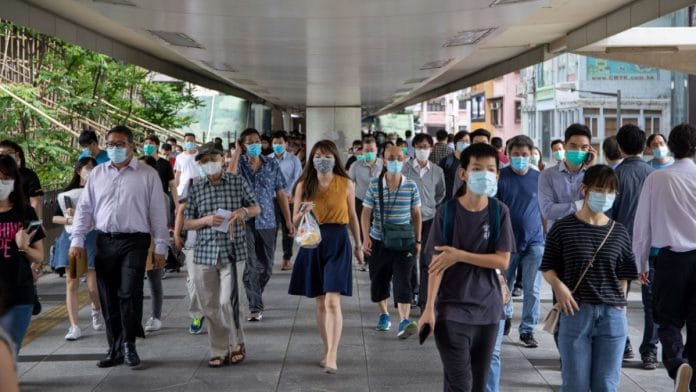Hong Kong: Hong Kong is about to embark on the world’s biggest experiment in voluntary testing and the China-backed company behind the blitz hopes 3 million residents will come forward for an exercise that could protect the city from future flareups.
Together with the 1 million in high-risk groups already screened, that would mean around half of the over 7 million population will be probed for asymptomatic infection, said Anthony Wu, chairman of Sunrise Diagnostic Centre Ltd., a local joint venture between China’s BGI Genomics Co. and Hong Kong-based China Biotech Services Holdings Ltd.
But with faith in the government low after a year of anti-China street protests and Beijing’s tightening grip on the city, it’s unclear how many people will come forward, particularly since the equipment and funding for the exercise were largely provided by mainland China.
“The willingness of the Hong Kong people to engage in the exercise will be a further indication of their trust in the health authorities to manage the process, and in the government to act on the findings,” said Nicholas Thomas, associate professor in health security at the City University of Hong Kong.
Hong Kong’s campaign, which kicks off on Sept. 1, will be the largest global attempt to test an entire city on a voluntary basis — unlike similar mandatory drives in the Chinese cities of Wuhan and Dalian, where residents were compelled to come forward. The effort could bring a greater sense of security after a recent resurgence of cases, and offer a model for other cities in unearthing hidden chains of transmission.
At the same time, the voluntary tests are shaping up to be a gauge of residents’ sentiment towards China as alarm grows over a controversial national security law. Activists in the city have raised concerns that China might use the testing to collect DNA data, though Hong Kong has dismissed those worries.
Sunrise has brought hundreds of lab professionals from the mainland over to Hong Kong for the testing exercise, which will use 16 air-inflated labs flown in from Beijing, where they were deployed during the Chinese capital’s June outbreak.
Who’s joining?
Jason Lam, a 32-year-old chef in Tsim Sha Tsui who is worried about getting infected as customers are showing up again in the restaurant, plans to volunteer. “I want to seek assurance for myself and my family whenever free tests are available,” he said.
Hung Kit-wing is also drawn to the free testing. But the 53-year-old, who works as a part-time cleaner to afford the rent on a subdivided unit he shares with several strangers in a poor neighborhood, questions the effectiveness of the drive. “Is it enough to only have one-off testing?” Hung said. “Honestly, I am still exposed to high risk of infection in such a living environment.”
One person who won’t participate is Alfred Wong, a cardiologist at a public hospital and member of a local medical professional group, in part because he doesn’t trust the reliability of mainland testing. The accuracy of testing has become an issue after Swedish authorities said they unearthed thousands of false positive results from BGI’s kits, which have been supplied to more than 180 countries and regions.
BGI said its tests are among the world’s most sensitive, and that a high rate of positive cases shouldn’t be seen as indicative of false results, but rather an ability to pick up infected people who appear healthy. Hong Kong’s government said they always run an official second test before confirming a case and that BGI’s tests and sample pooling method have passed accuracy assessments.
Sunrise — aided by BGI — is now the largest testing force in Hong Kong. With a daily capacity of 130,000 tests, it can examine about half a million samples per day if batching five samples into one.
The uncertain level of participation underscores the challenges facing Hong Kong’s government as it tries to implement policies to control Covid-19 amid the growing political divide in the city. Those who test positive will have to check into a makeshift hospital for quarantine to prevent them from infecting their family members or others in the community, which could also deter people from coming forward.
“It’s unthinkable in Hong Kong to make testing, even a vaccine for that matter, mandatory, because you can’t enforce it,” Bernard Chan, a top adviser to Chief Executive Carrie Lam, said in an interview. “But we should make it available.”
Also read: Coronavirus in vacant Chinese apartment suggests it could’ve spread through toilet pipes
Worst outbreak
The test drive comes as Covid-19 cases are dwindling in the city’s worst outbreak, which started early last month. Daily new infections locally have dropped from a peak of 145 to below 25 for the past nine days.
The government has started to relax some social distancing rules as cases wane. Health experts see the testing as an additional weapon against the disease, and a rehearsal for any resurgence of infection.
“A more important aim of this scheme is to build testing capacity,” said Lam Ching Choi, a member of Lam’s advisory Executive Council and medical doctor. “If we don’t do it at this time, when the fourth wave comes — and if it’s bigger, as expected by many experts — in the winter months, we’ll have great trouble.”
Sunrise’s Wu says the company’s air-inflated labs now set up at a sports center are likely to stay in a Hong Kong warehouse after the drive, and can be in operation again within a week if needed.
“We never know whether the winter surge is coming and whether there’ll be the fourth wave,” said Wu. “But it’s better to be prepared.” –Bloomberg
Also read: Two confirmed Covid-19 reinfections in Telangana increase concerns about immunity







Sir, in our Bengaluru also, Corona test is a matter of trust. Between BBMP officials, Hospitals and diagnostic laboratories, they decide every day how many tests should show corona positive? Facts and truth be damned.